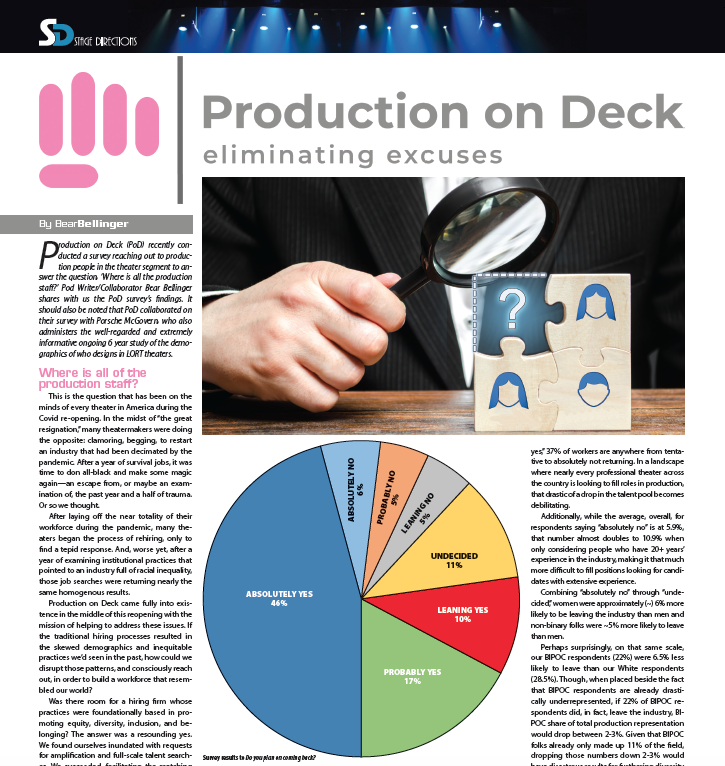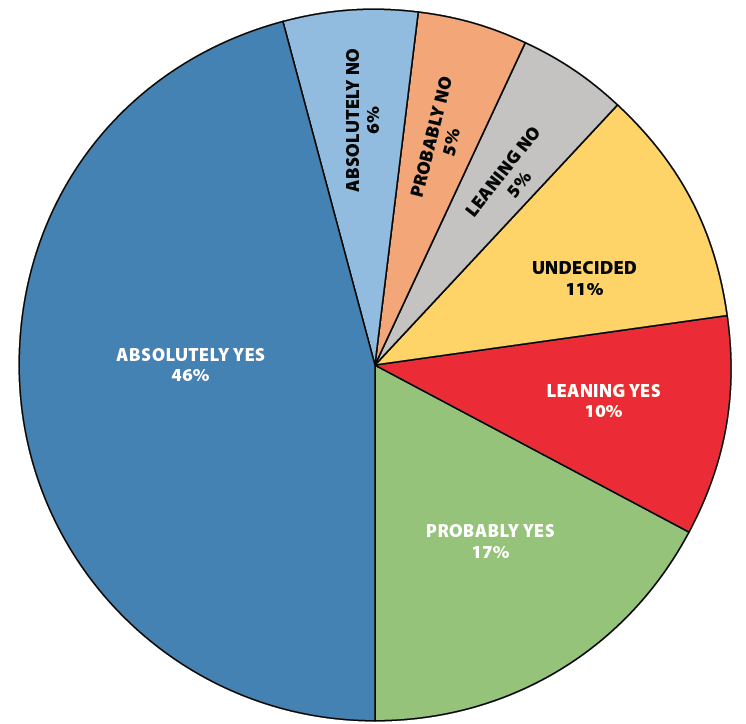
Production on Deck (PoD) recently conducted a survey reaching out to production people in the theater segment to answer the question, ‘Where is all the production staff?’ Pod Writer/Collaborator Bear Bellinger shares with us the PoD survey’s findings. It should also be noted that PoD collaborated on their survey with Porsche McGovern, who also administers the well-regarded and extremely informative ongoing 6 year study of the demographics of who designs in LORT theaters.
Where is all of the production staff?
This is the question that has been on the minds of every theater in America during the Covid re-opening. In the midst of “the great resignation,” many theatermakers were doing the opposite: clamoring, begging, to restart an industry that had been decimated by the pandemic. After a year of survival jobs, it was time to don all-black and make some magic again—an escape from, or maybe an examination of, the past year and a half of trauma. Or so we thought.
After laying off the near totality of their workforce during the pandemic, many theaters began the process of rehiring, only to find a tepid response. And, worse yet, after a year of examining institutional practices that pointed to an industry full of racial inequality, those job searches were returning nearly the same homogenous results.
Production on Deck came fully into existence in the middle of this reopening with the mission of helping to address these issues. If the traditional hiring processes resulted in the skewed demographics and inequitable practices we’d seen in the past, how could we disrupt those patterns, and consciously reach out, in order to build a workforce that resembled our world?
Was there room for a hiring firm whose practices were foundationally based in promoting equity, diversity, inclusion, and belonging? The answer was a resounding yes. We found ourselves inundated with requests for amplification and full-scale talent searches. We succeeded, facilitating the matching of talented candidates with multiple theaters while fielding diverse and qualified finalists for consideration. But, even within our success, the process was more difficult, more time consuming, than we had anticipated.
It was easy to understand why few BIPOC candidates might want to relocate to a predominantly White institution, in a predominantly White geographic location, in the midst of a pandemic. It was more difficult to understand why we were finding few candidates for roles in major metropolitan areas with comparably higher salaries and benefits. Where is all of the production staff?
The Results
In collaboration with [Lighting Designer] Porsche McGovern, we commissioned a survey to find out. The survey was shared widely, leveraging social media in addition to personal and professional networks. It asked folks their discipline, gender, race/ethnicity, length of professional experience, whether they had left the industry, whether they were looking for work, if they planned to leave, why they would leave, and why they would stay.

When asked, “do you plan on coming back,” the results, out of 898 participants, were:
- Absolutely No 5.9%
- Probably No 5.3%
- Leaning No 5.5%
- Undecided 11%
- Leaning Yes 9.6%
- Probably Yes 16.7%
- Absolutely Yes 45.9%
Those numbers feel encouraging. The overwhelming majority of people in production are planning on returning. But, if you take the people who are anywhere from “undecided” to “absolutely no,” that is almost 28% of the industry. If you add in the people who are “leaning yes,” 37% of workers are anywhere from tentative to absolutely not returning. In a landscape where nearly every professional theater across the country is looking to fill roles in production, that drastic of a drop in the talent pool becomes debilitating.
Additionally, while the average, overall, for respondents saying “absolutely no” is at 5.9%, that number almost doubles to 10.9% when only considering people who have 20+ years’ experience in the industry, making it that much more difficult to fill positions looking for candidates with extensive experience.
Combining “absolutely no” through “undecided,” women were approximately (~) 6% more likely to be leaving the industry than men and non-binary folks were ~5% more likely to leave than men.
Perhaps surprisingly, on that same scale, our BIPOC respondents (22%) were 6.5% less likely to leave than our White respondents (28.5%). Though, when placed beside the fact that BIPOC respondents are already drastically underrepresented, if 22% of BIPOC respondents did, in fact, leave the industry, BIPOC share of total production representation would drop between 2-3%. Given that BIPOC folks already only made up 11% of the field, dropping those numbers down 2-3% would have disastrous results for furthering diversity goals.
Lastly, when it comes to BIPOC representation, ~46% of respondents had under 10 years’ experience in the industry compared to ~27% of their White counterparts, leaving those same BIPOC practitioners designated to the realm of early career.
This all points to a job field with potential substantial losses in overall talent, as well as a specific reduction in talent from communities who have been historically marginalized in our industry.
But, why?
A few themes struck out in the answers.
ABUSE:
“I’m considering leaving. The atmosphere created by our industry’s reliance on illegal unpaid labor/wage theft, unpaid overtime, unsustainable daily/weekly hours, and the unacceptable emotional abuse that follows is becoming unbearable. Employer’s abuse, and employees pay it forward.” —White, Male, 25-29 years’ experience
“After the unethical way my theater of 16 years has treated me and so many others, I’ve decided to place positive workplace culture, and a sustained record of adherence to positive values in treatment of staff above all else. Unfortunately, most of the theater positions I’d be interested in are at other institutions who have been bad actors towards their staff, and I will not put myself in a position to endure that again.” —White, Female, 20-24 years’ experience
HEALTH:
“Covid pandemic, mental health reasons. The lifestyle of working in theater was no longer serving my ability to put my health and happiness first. The pandemic gave space to reevaluate my life and while I want to continue to work in theater, I’m not sure it’s healthy for me to do so.” —White, Female, 10-14 years’ experience
“I recognize that my disability makes it impossible to return.” —White, Female, 30-34 years’ experience
MONEY:
“No job! I have a child to support. My new gig pays twice what I used to make and I’m home more.” —White, Mexican, Female, 15-19 years’ experience
“I love my work. I want to have my career back. But I’m not sure how to do that, be an ally, be a parent and survive financially. —White, Female, Queer,
25-29 years’ experience
RESIGNATION TO STAY:
“Not sure how to exit and am doing what I can to get my heart back into it.” White, Female, Trans, 35+ years’ experience

A New Perspective
Our industry has, in its recent history, been structured in a way that relies on love of the medium rather than the promise of a lucrative career. Identity, community, and, at times, family get looped into what it means to be a theatermaker in a way that creates an environment ripe for exploitation.
But, with last year’s pause, people had the time to examine what they want out of life while simultaneously being forced to find a new way to pay their bills. Through this experience, many learned that there are ways to maintain their joy through a job that pays a living wage and grants benefits. It is often distance that allows objectivity, this pandemic forced a distance many artists have never had the benefit of taking due to the grind of the industry. It’s hard to acknowledge the abuse from one’s ‘family’ until you have the freedom to escape.
Our industry is at a precipice. Live performance will always have a foundational presence in society. Many of us entered this profession because we felt that impact, the tug of shared emotion in a room full of relative strangers all connected to one stage, one moment. As many of us learned in the virtual world, there is no proper imitation.
But we are being shown, in real time, the effects of years of neglect and abuse on a populace whose connection to their job is not based in commensurate compensation. When forced to realize that their love of the theater was not enough to sustain them through a pandemic, when shown that they were expendable as soon as a crisis hit, production folk began to imagine other futures and saw them to be bright.
If we don’t begin to reimagine arts funding, if we don’t start seeing things like a livable wage, health insurance, and childcare as base requirements rather than perks to be achieved, if we don’t collectively internalize that equity, diversity, inclusion, and belonging don’t start and end with a statement but rather must be sewn into the fabric of our workplace culture, we will continue to see an exodus.
This is an awakening of the workforce, and we must respond with compassion and support rather than condemnation.
That response starts with leadership.
Ask yourselves these questions:
How equitable is your compensation structure? Have you implemented succession plans? Are you ensuring professional development in every member of your organization? How are you supporting employees with disabilities? Black employees? Trans employees? Are you setting up new hires for success with an onboarding structure or throwing them to the wolves? Do your working hours make it possible for your employees to have a healthy life outside of work? Are you ensuring work/life balance? Are you reflecting the communities in which you reside and building relationships to ensure you are a part of that community rather than just geographically located within it?
These prompts begin a long process, but they are vital to the future of our industry. And, while it starts at the top, leadership is a quality that extends through every level of an organization. The responsibility to change a culture must be shared throughout the whole. The bottomless well of ‘disposable’ talent theater has relied on exploiting is finally drying up. It is past time we examine the practices we take for granted and move towards a future that is sustainable for all of us rather than solely those at the top.
I’ll leave you with one last survey response: “The company I work for took great care of their employees over the pandemic. Since returning, the workplace has been consistently working to change the status quo and make working in theater a humane and sustainable career. I want to be involved in that work.” This is a foundation for the future of the theater industry: acknowledging that there is work to be done, understanding that it is ongoing, and committing to participate in that work together. We can create a more humane industry. We can create a more sustainable industry. But it will take an honest examination of our past faults and a radical reimagination of our future. Start with the prompts and then go further.
There is hope. We can do this together. Let’s get to work.
Production on Deck (PoD) is a talent and consulting firm for theatrical production roles that identifies talent from marginalized communities. They conduct talent acquisition searches finding positions for a number of production people. They seek to expand the traditional idea of the talent pipeline, and increase pathways for marginalized communities to access jobs in theatrical production. With a focus on inclusion, diversity, equity, and belonging, PoD broadens the definition of ‘the best person for the job’ to one that welcomes the whole of an individual into a room. Find further information about Production on Deck at
www.productionondeck.com .


